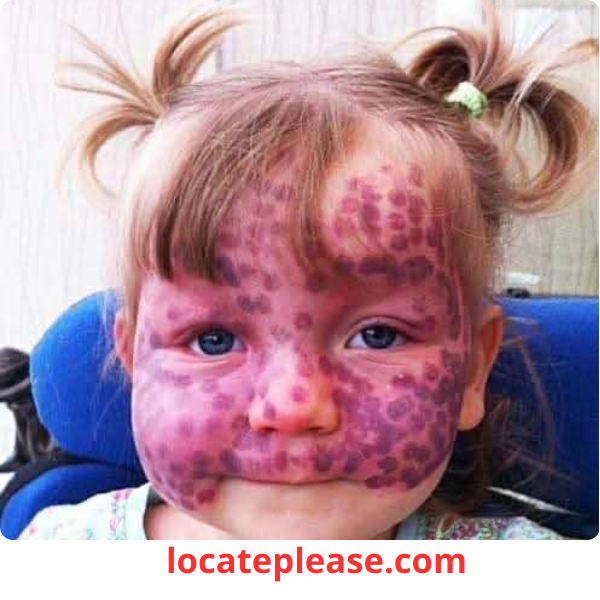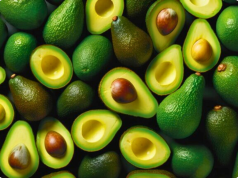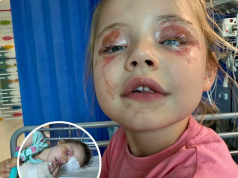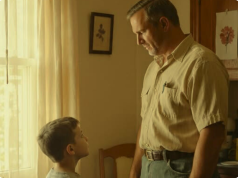Every parent dreams of a healthy, joyful start for their child.
For Paul and Rebecca Callaghan, that dream took a heartbreaking turn the moment their daughter, Matilda Rose, was born.
Born prematurely and immediately rushed into emergency care, little Matilda entered the world with visible marks that doctors at first mistook for birth bruises. But within days, it became clear: this was something far more serious.
Matilda was diagnosed with two rare and complex conditions:
🔹 Tracheo-Oesophageal Fistula (TOF) — a rare birth defect where the windpipe and esophagus are abnormally connected
🔹 Sturge-Weber Syndrome — a neurological disorder marked by a port-wine stain birthmark, caused by an overgrowth of blood capillaries near the skin’s surface, typically on the face.
For Matilda, the port-wine stain covers much of her face — a permanent reminder of a condition that also puts her at risk for glaucoma, seizures, muscle weakness on her left side, and developmental delays.
But while her medical journey has been grueling — including multiple surgeries, life-threatening complications, and ongoing laser treatments — one of the hardest challenges her parents face isn’t medical.
👉 It’s the judgmental stares and cruel assumptions from strangers.
“They Think She’s Been Abused”
Every time Paul and Rebecca take Matilda out in public, they brace themselves.
People stare.
They whisper.
Some even accuse them of child abuse — convinced the marks on Matilda’s face are bruises from violence.
Rebecca shared:
“It breaks my heart. We’re doing everything we can to keep our daughter healthy, and instead of compassion, we get suspicion and judgment.”
The irony?
The polka-dot marks often seen on Matilda’s face are from laser treatments — a vital part of her care to prevent the port-wine stain from spreading deeper and affecting her brain or eyes.
These treatments, which she’s undergone every two months since infancy, leave temporary red or purple dots that fade after a few weeks — but because the treatments are so frequent, her face is often covered in them.
To the uninformed, it looks like injury.
To her parents, it’s a symbol of strength — of a little girl fighting every day just to thrive.
A Brave Little Warrior
Despite everything, Matilda is a fighter.
She’s endured:
- Multiple surgeries in her first weeks of life
- Two cardiac arrests where she had to be resuscitated
- Ongoing laser therapy until she turns 16
- Regular monitoring for glaucoma and seizures
Yet, her parents say she’s full of joy, laughter, and resilience.
“She smiles through pain,” Paul said.
“She’s stronger than anyone I know.”
Parents Speak Out: Educate, Don’t Judge
The Callaghans are speaking out not for sympathy — but to raise awareness.
They want people to understand:
- Not all skin marks are signs of abuse
- Rare conditions exist — and they’re not always visible in textbooks
- Kindness and curiosity are better than judgment
“Before you stare, before you whisper, before you assume the worst — just stop,” Rebecca urges.
“Say hello. Ask a kind question. Or simply smile. That’s all it takes to make a difference.”
They’ve also partnered with Sturge-Weber UK, a charity that supports families affected by the syndrome, to spread education and advocate for children like Matilda.
How You Can Help — Without Saying a Word
You don’t need to confront or question a parent to show compassion.
Sometimes, the most powerful actions are the quietest:
✅ Smile warmly — it breaks the ice and shows acceptance
✅ Treat the child normally — talk to them, not over them
✅ Educate yourself — conditions like Sturge-Weber affect 1 in 20,000–50,000 births
✅ Speak up gently — if you hear someone making assumptions, share what you’ve learned
💙 A Message of Love and Resilience
Matilda’s story isn’t just about a rare disease.
It’s about love, courage, and the unbreakable bond between parents and child.
It’s about a little girl who, despite facing more challenges in her few years than most do in a lifetime, still lights up a room with her smile.
And it’s a reminder that kindness is a choice — one we all make every time we see someone who looks “different.”
So the next time you see a child with visible differences,
👉 Pause.
See the person, not the condition.
Respond with empathy — not fear.
Because behind every scar, every mark, every challenge —
There’s a family fighting their own quiet battle.
And sometimes, all they need is a little understanding.
Beauty isn’t perfect. It’s brave. And Matilda Rose is more beautiful than words can say.






